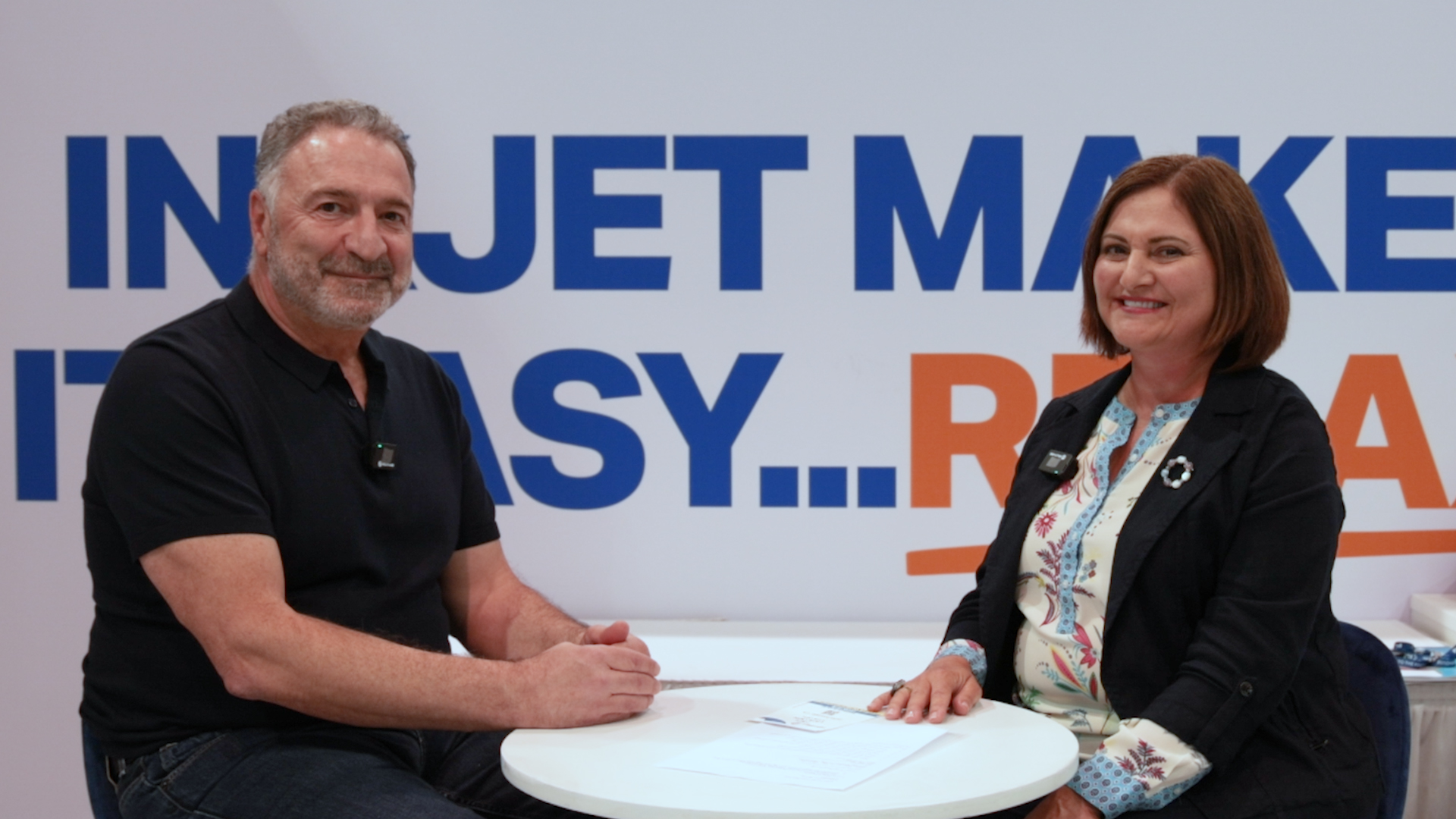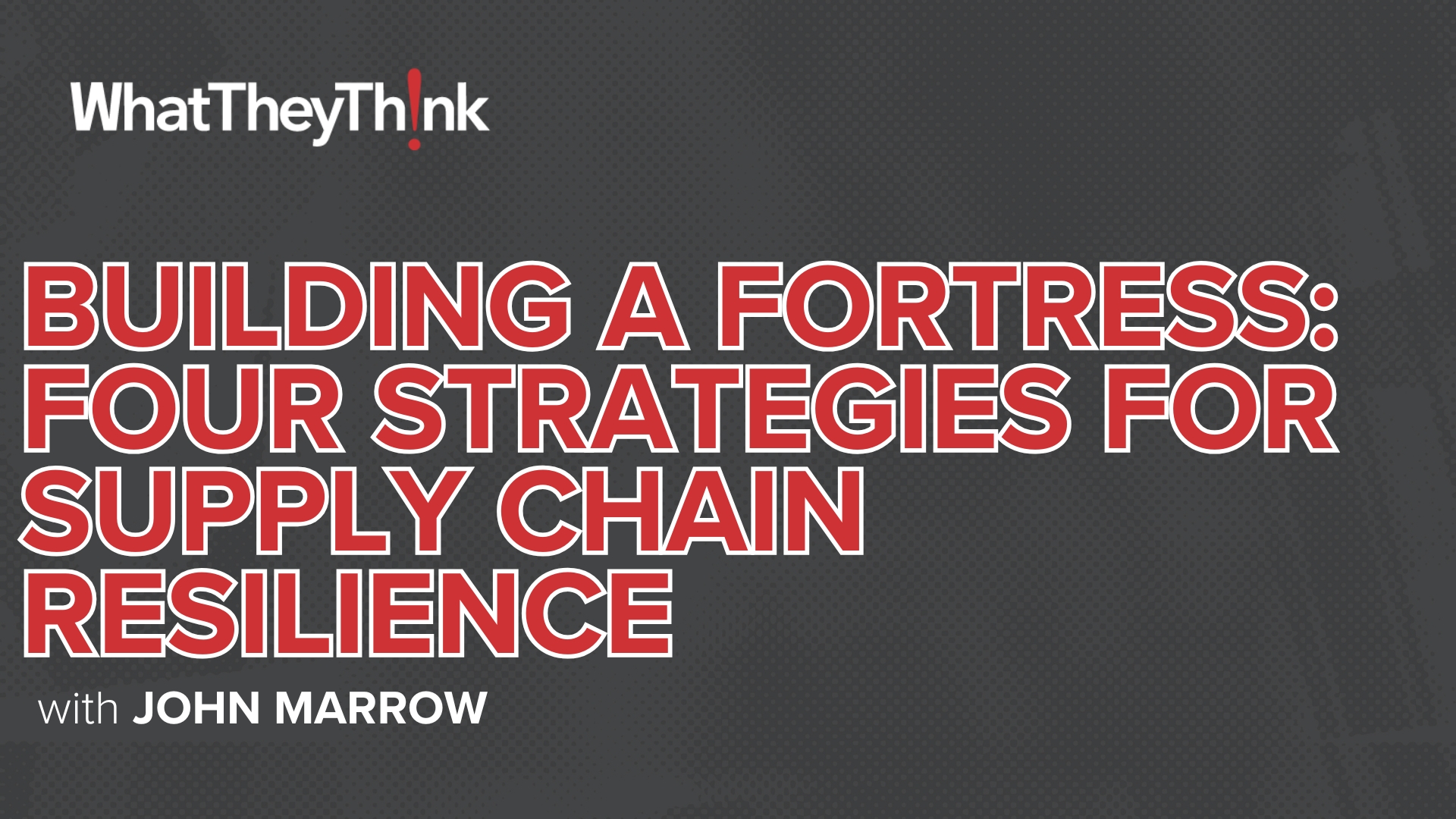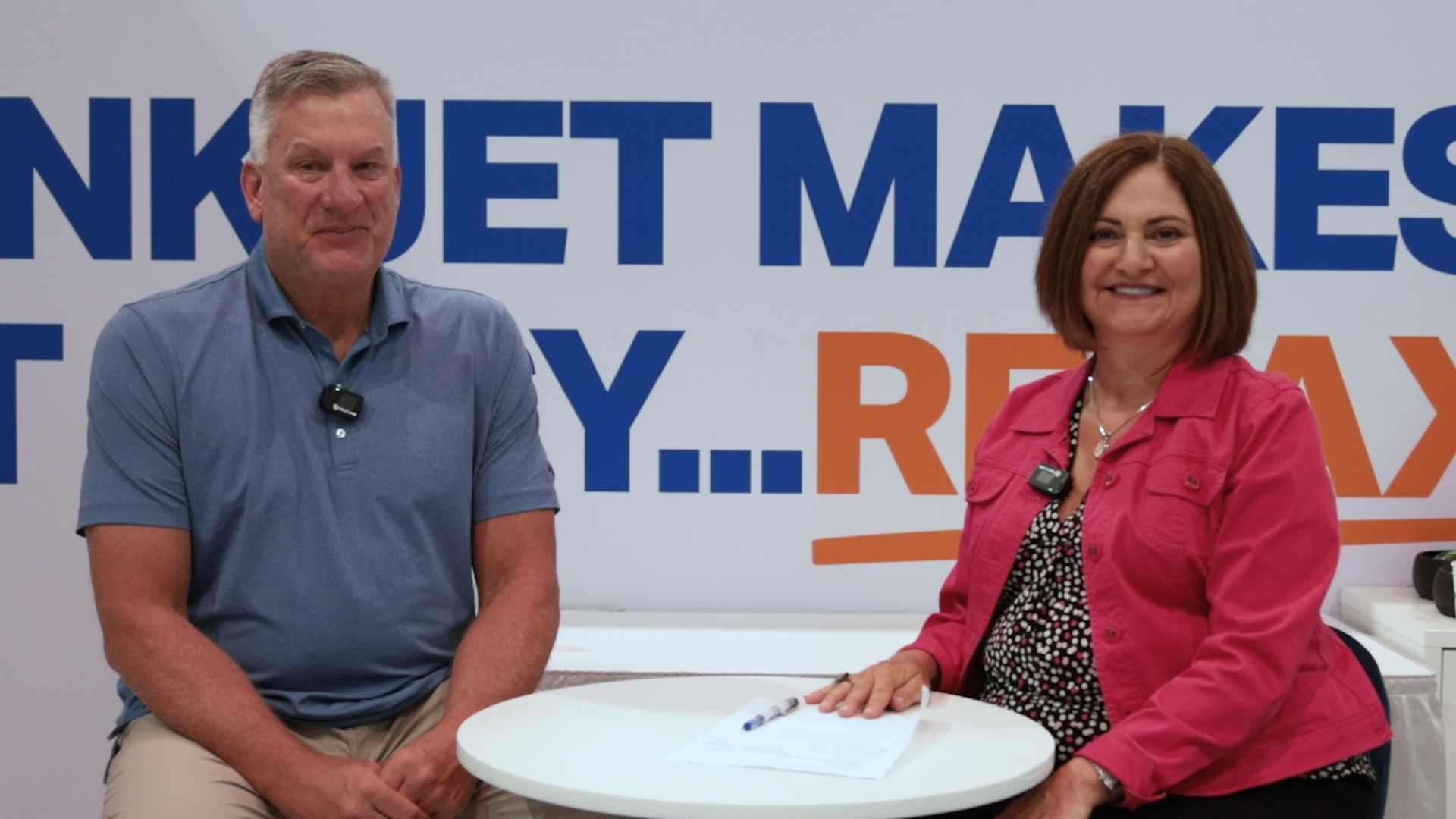Commentary & Analysis
Displaying 6151-6250 of thousands of articles
Insight You Need. Analysis You Trust.
Get the trusted insights you need to understand our evolving industry and emerging trends. Become a Premium Member.
Pitney Bowes President, Document Messaging Technologies, Ramesh Ratan Shares PB Strategy, Industry Outlook
In September 2009, Ramesh Ratan left his position as COO at The DMA (Direct Marketing Association) to become President of Pitney Bowes’ Document Messaging Technologies (DMT). In this interview with Senior Editor Cary Sherburne, Ratan talks about his reasons for joining Pitney Bowes, his top strategic initiatives for the organization, the role printers can play in the age of digital media, and much more.
Broadband hours and the statistical relationship with printing volumes
Broadband use by adults has been increasing and the number of households with broadband service has almost doubled since 2005. What's the relationship with commercial printing volume? Last year, there were about 48 billion hours of broadband use by households, and every additional hour of use decreases commercial print volume by about $2.
MSP Digital Marketing and TecDoc Digital Solutions: The Case History of an M&A Transaction Done Right
When four print industry veterans decided to form a national network of digital services for marketing communications, they knew they would need the help of an M&A expert. Realizing that the digital universe is huge, they understood that locating the right acquisition targets within it was a task they could entrust only to an advisor possessing "industry knowledge, financial acumen, and a great database." Read how MSP Digital Marketing, with the help of New Direction Partners, took a successful first toward building its network with the well-executed acquisition of TecDoc Digital Solutions.
Your Web Site… It’s Where Prospects Find You!
Possibly the most important reason that print service providers need to have an active Internet marketing strategy is because of the transformation that has occurred in how print buyers seek information. Yes, customers and prospects still talk to sales representatives, look through magazines, and talk to business associates to gather product information, but print service providers need to understand that customers and prospects are turning en masse to the Internet as their primary knowledge source. More than three-quarters (78%) of adult online consumers in the U.S. made some type of purchase via the Web in the previous six months. According to a survey from Nielsen Online, the top transaction categories are travel, credit card management, and online banking.
Nothing Confuses Like Statistics
Things are not always what they seem, especially when statistics are involved. How else can one explain a GDP report of +5.7% and a decrease in the unemployment rate being matched with long faces and pessimism? The economic side-step is continuing, and a mild upturn is being viewed with suspicion. Every time there's good economic data, it seems to barely survive the headline and first paragraph of its press release without devolving into adjustments, revisions, and clarifications. Our job as managers is not just requiring navigation skills, but seems to need a refresher course in defensive driving.
The acronym that is improving graphic arts education
ACCGC. You never heard of it? Accrediting Council for Collegiate Graphic Communications. Doesn’t ring a bell? It is a group of dedicated graphic arts educators and industry suppliers who foster graphic arts education at the college level. Accreditation is how colleges and universities serve professions and industries—by making sure that educational curricula meet the needs of professions and industries.
Print Service Providers Are Going Social!
Now that social media has entered the mainstream, print service providers that build the right marketing strategies have more opportunities than ever. A number of savvy print and marketing service providers are getting into the game and effectively leveraging social media to keep the lines of communication open with their customers. This article discusses how companies like Vistaprint and Tukaiz are using social media to drive business results.
An Interview with Mark Hischar, KBA North America
As it did to every other print equipment manufacturer, 2009 brought a host of challenges to Koenig & Bauer AG (KBA). Declining orders, a change of leadership at the top, job cuts further down the structure, and uncertainty about the future cost this global distributor of sheetfed and web offset presses some momentum.
Differentiating Your Business: Make Sure it’s More Than Just Talk
After presenting you with the tools to develop your Differentiating Strategy and Unifying Business Idea, we’ll turn our focus to creating real differentiation in your business. This means, going beyond what you hope to be…and just peppering your marketing and sales materials with “the new strategy.” This means aligning your entire organization; your policies, practices, products, services, hiring, pricing AND your communications to your new Unifying Business Idea. The stories we share show the payoff.
A Buyer’s Guide for Inkjet Presses
This year is being seen as the real start for sales of high-speed inkjet presses. This article looks at some of the key items that need to be considered by potential buyers of these presses. This includes substrates that can used, the types of ink and the life of the print heads.
Year/Year US Gross Domestic Product
Why was Q4-09 GDP +5.7% met with a stock market decline and more handwringing about the economy? Dr. Joe looks at the yearly change in GDP, and explains it all.
Printing in the Dominican Republic
I had the opportunity recently to visit one of the largest printing operations in the Dominican Republic, in a visit arranged by Executive Vice President Fernando A. León. I have visited many printing operations in the U.S., and I was interested to see how this compared—it was quite impressive. I thought our readers might enjoy sharing a virtual walk-through.
Disrupting the Future
A contrarian look at the printing industry and the new rules and strategies needed to succeed.
Quality of Hire Begins With Sourcing: Pick Your Method to Suit Your Needs
The first step toward achieving quality of hire is effectively sourcing the candidates from which to choose. In this article, we take a look at what options there are for sourcing new hires and some of the pros and cons to each of them.
Small and Medium-Sized Businesses, A Marketing Services Opportunity!
Small and medium-sized businesses have a wide range of communications needs. This article discusses the tremendous opportunities that small and medium-sized businesses can represent for print service providers with the right go-to-market strategy.
How To Stand Apart from Competitors: Define Your Unifying Business Idea
Having a Unifying Business Idea (UBI) is arguably the most powerful strategic tool you can develop for your business. The purpose of a UBI is to help govern a company…to help guide what markets to enter and new products to develop…to help create customer service policies…to build employee training programs so that people can make daily decisions. A UBI is the “container” for your company strategies, practices and values. The goal is to have a UBI that summarizes the very essence of your company.
Newspaper Industry Woes Not Being Cured By Online Revenues
Newspapers were supposed to survive the new media age because of their highly educated, high income audience, and then when that didn't work, their superior content would make news websites into Internet advertising magnets. Now, even online advertising is shrinking for newspapers. What's next?
Adobe Discontinues Worldwide Adobe Partner Connection Print Service Provider Program
On January 4th, we posted a PrintCEO blog notice that Adobe had decided to discontinue the worldwide Adobe Partner Connection Print Service Provider program, effective February 4th. Since that time, we spoke with Adobe and connected with a number of people in the field, both through live conversations and dialog on the blog. This was important, since the Adobe announcement came as an email through its PR agency, rather than letters to customers or a formal press release, although we do understand that all authorized and premium members received an email about the program closure. We wondered, as did many of our readers, what was behind this, why Adobe chose to do this now and what it means for Adobe’s commitment to the printing industry.
Adobe, you're breaking my heart
Adobe Systems helped to build the modern printing industry and now, it appears, they are hellbent on destroying it -- not by willful action, but by neglect. Without the de facto standard of PostScript, digital printing could not have made the inroads it did; CTP would not have happened as we know it; and PDF would not have created the ability to move files around with ease, irrespective of device or resolution. They were active supporters of the printing industry and worked with print providers and users alike. But, today, Adobe appears to have written off print as it focuses on Flash and new media. Some say Adobe has given the printing industry the finger.
2010: A Year of Innovation for the Graphic Communications Industry (Part 2)
This column is the second in a two-part series that provides Barb Pellow's perspective on a strategic direction for 2010. Last week's article discussed techniques for increasing share and adding value in the new year, and this one outlines strategies for product innovation that service providers can use to position themselves as market leaders.
How Unique Is Your Business?
Have you gone through an honest process to land on a differentiating strategy – and taken a more focused approach to your business? I’m going to share the first of two great tools to help. In this post we cover: Creating Your Differentiating Strategy. Learn how to wrestle with, and answer, three fundamental strategic questions: Who is your core target customer? What business category are you competing in? And, what is your unique point of difference?
IPA Leadership Conference Takes Fresh Approach
The IPA Leadership Conference is taking a different route and it looks like a not-to-be-missed event where you can hear from and hobnob with thought leaders from the marketing discipline, including the former CMO of Walmart. If you think you know what marketers want, you may want to think again and take advantage of this opportunity. As a special offer for our readers, IPA is offering a $100 discount off the cost of conference attendance.
Is 2010 the Year for Digital Printing for Publishers?
The world of publishing has hardly been impacted by developments in digital printing, unlike other areas of printing. Almost all the developments in digital printing have been aimed at short-run commercial printing, variable data printing, and more recently web to print operations particularly in the business to consumer area. It is only in the area of reprints of monochrome books where reprinting by offset would be too expensive for publishers that digital printing has had an impact in the publishing space. It would appear that this year will see the start of a change as book publishers look to digital printing to change their business models to reduce their capital tied up in inventory. This is becoming possible through the use of high-speed continuous inkjet presses that will allow a switch from offset to digital printing for first runs of books. It is however unlikely that we see either many newspapers or magazine publishers moving to the use of digital printing at this time unless they rethink their advertising driven business models.
Same Old, Same Old is Getting Tiresome
Dr. Joe starts his eighth year with WhatTheyThink, and he's less Dr. Doom-ish. There are some signs, though not confirmed, that the industry may have finally finished riding a steep and traumatic downdraft and found a steadier level with a more gradual and predictable outcome. November shipments were down at the lowest rate of any month in 2009, and there were only 100 fewer print workers in December than there were in November. The national economy still has its problems, employment is actually worse than most realize, and incomes are still under pressure. The Bureau of Labor Statistics forecast print employment for 2018, and their forecast is, unfortunately, already fulfilled.
Are You Utilizing All Your Purchasing Options?
At one time, size was the primary means for independent printing companies to gain leverage in the purchasing arena. Few other options were available. Today, however, companies can maximize their profitability in a variety of ways. Here are a few ideas...
2010: A Year of Innovation for the Graphic Communications Industry
This column is the first in a two-part series that provides Barb Pellow’s perspective on a strategic direction for 2010. It discusses how print service providers and marketing service providers can position themselves for success in an industry that has undergone permanent shifts and changes.
Employment Outlook for 2010: Where have all the good people gone?
In a recession, ambitious, proactive people don’t just sit around and wait for a return to economic prosperity. Even if they aren’t employed already or can’t find work along their usual lines, they’ll turn to some entirely different pursuit instead—responding to all the hype being circulated about working for yourself by choosing from among the multitude of support mechanisms and project, franchise, work-from-home or consulting options available. While some may be forced into it by circumstances, others will welcome the self-employment alternative as an avenue to change their career path – something they may have wanted to do for a while. And the most inventive ones may go on to even greater career success by launching novel innovations into the marketplace. In the past such enterprising spirits have been responsible for many of what have become today’s mainstream products and services.
What Happened to LVI?
As a follow-up to Gail Nickel-Kailing’s post on PrintCEO about DS Graphics’ acquisition of LVI (formerly Lavigne Inc.), I spoke to DS Graphics’ Vice President, Jack McGrath, to find out how the integration of the two companies was proceeding, and to gain more detail about the actual events that occurred leading up to DSG’s acquisition of the assets of the company.
The Twelve Days of Printers’ Christmas
On the first day of Christmas,
my true love sent to me
An ink cartridge in an HP.
On the second day of Christmas,
my true love sent to me
Two ruddle gloves,
And an ink cartridge in an HP.
HP – Moving Ahead in High-Speed Color Printing
On a recent visit to the USA I was invited to meet with executives of HP’s Inkjet High Speed Production Solutions division to discuss the current status of its program for the HP T300 inkjet web press. I found this to be an interesting visit as almost nothing had been written about what HP had been doing by either the trade press or the industry analysts following Print 09.
Coleman Kane Shares Printable Update, Industry Thoughts, Getting Marketers Hooked
It has been some time since WhatTheyThink has hooked up with Coleman Kane, CEO of Printable. Following a flurry of press releases on new integrations, WhatTheyThink checked in with Coleman to get more detail, and to get his perspective on the industry as we exit what has been a difficult 2009 for the industry.
The show’s the thing
Andy Tribute’s column this week was thought-provoking as usual. He opined that an annual printing event is no longer viable and that GraphExpo should be on a different schedule. In the 1980s (the heyday of the printing industry) there were multiple printing events. The New England show was every two years — in January! New York had an annual show at the old Coliseum, PICA had a large annual event in Charlotte, and Midwest Graphics floated around different states. Graphics of the Americas took over the Miami Beach Convention Center. The Gutenberg Festival in Long Beach was a major event.
Reinventing The Print Business Model
A 2008 Harvard Business Review article, "Reinventing Your Business Model" by Mark Johnson, Clay Christensen and Henning Kagerman states that the secret to maintaining a thriving business is recognizing when it needs a fundamental change. According to the article, “Great business models can reshape industries and drive spectacular growth. Yet many companies find business-model innovation difficult. Managers don’t understand their existing model well enough to know when it needs changing—or more importantly, how to change it.”
Do We Need Graph Expo Each Year?
There has been much discussion about association consolidation and the limited funds industry suppliers have to support many of the organizations and events in the industry. I want to discuss the PRINT 09 event that is organized by the Graphic Arts Show Company (GASC).
Oh, Those Cable TV Talking Heads
You'd think that all of the economic wounds of the U.S. economy were healed all at once when last Friday's unemployment report was announced. For some reason, the good news in it was glossed over, and the bad news was ignored.
Ubermarketer Vistaprint Makes Course Correction
Many in the investment community view Vistaprint as an extremely successful and profitable printing company. Printers across North America point to the company as a model: “If I could just be another Vistaprint.” If you look a little more closely, you’ll see that Vistaprint is not “just another printer,” it’s a sophisticated marketing company that sells marketing products and services to consumers and small/micro businesses. They just happen to print those products.
Augmented Reality…It’s More than Hype!
As we look back at 2009, a technology milestone for the printing industry, marketing communications, education, and the media world may be the rise of augmented reality. Augmented reality (AR) is a field of computer science that involves combining the physical world with an interactive, three-dimensional virtual world.
FedEx Office and UPS Face Off with Online Offerings
We recently spoke with The UPS Store's Christa Martin (VP of Product Development & Management) and FedEx Offices Anthony Norris (VP of Digital Access Marketing) about their businesses and competitive positioning in the marketplace.
Consolidated Graphics’ Jim Cohen on the State of the Industry and CGX
As this recession drags on, WhatTheyThink is reaching out to various companies to see how they are doing, and what they are doing to survive and thrive. We had the pleasure of speaking recently with Jim Cohen, Executive Vice President of Mergers and Acquisitions at Consolidated Graphics. He had some very interesting insights to share.
Getting a grip on mission-critical “soft” skills: 5 simple steps
Effective hiring and staff management aim to maximize the return from your company's human-capital investment and minimize the related financial risks. But obviously, you can’t hope to achieve these goals without at least a basic ability to assess the potential of people. In fact, people assessment is as essential a prerequisite for conducting performance reviews, promotions, and succession planning with your existing staff as it is for establishing benchmarks for new hires.
Protect Intangibles to Preserve Company Value
A company's general intangibles have a very tangible impact on a company's valuation. Intangibles that are perceived as attractive can greatly enhance a company's value while negative or negligible intangibles can drag it down. To safeguard the worth of their businesses, NAPL Senior Vice President and Consultant John Hyde believes that graphic communications company owners should take proactive steps to protect their intangibles.
How Valuable Are You in the Marketing Supply Chain?
I recently read two reports issued by the CMO Council that are definitely a must-read for anyone in our industry. Taken together, the two will arm innovative print service providers (dare I say marketing services providers??) with much of the ammunition they need to start a conversation at the highest levels in customer marketing organizations. Here are a few highlights, and some of them are pretty scary!
Look to 2010—Because You Really Have No Choice
This week, WhatTheyThink published our latest graphic communications industry forecast report, cleverly titled Print and Creative Forecast 2010, a look back at the year that was and, naturally, a look ahead at the year that will be. I worked on it with Dr. Joe Webb, whose Economic and Research Center data provided good chart-fodder for our quantitative analysis and forecast.
Tuck In, Luck Out: A Guide to an M&A Opportunity Built for Two
There’s strength in numbers, goes the old adage, but there’s also strength in the power of one—a cumulative strength that printing companies can achieve by undertaking the kind of merger known as a “tuck-in.”
Print Service Providers: Making the Connection
In today’s economy, print service providers face the same challenges as any other marketers. They must be creative and challenge themselves to push beyond the boundaries of their minds—they must think outside the box for innovative ways of reaching customers and prospects. This requires an effective communications strategy that builds awareness while educating prospects and clients about the capabilities you offer.
Behind the Agfa Acquisition of Gandinnovations
We may call this “the week that was” when looking back at the stories for 2009 in our year-end review! The Monday news opened a few eyes over morning coffee. While the Canon acquisition of Océ grabbed the day’s headlines; the second story – Agfa’s acquisiton of Gandinnovations – was just as interesting.
Canon and Océ, Can They Become Number One?
Yesterday’s announcement that Canon is to acquire all the shares of Océ is obviously of great interest. Canon and Océ aim to create the overall No. 1 presence in the printing industry building on an enhanced scale and a combined history of innovation and excellent client servicing. The combination of the two companies is designed to capitalize on excellent complementary fit in the product range, channel mix, R&D and business lines.
Canon's Acquisition of Océ: The Details
Following Canon’s announcement that it would acquire Océ, WhatTheyThink spoke with a number of sources to get more detail on this significant acquisition and continued sign of industry consolidation. While Canon proposes to purchase Océ at a 70% premium on the stock value, it works out to about 50% of Océ’s annual revenues. The press release is fairly detailed about the terms and conditions.
Following the Prinergy Saga
There was quite a firestorm of online activity following a post at Prepress Pilgrim indicating that Kodak was moving its Prinergy development efforts to Israel and laying off everyone at the Willingdon Avenue plant in Burnaby, British Columbia, Canada. This started rumors that Kodak was shutting down development of Prinergy. PrintCEO blog posted a Kodak statement with the company’s assurances that Prinergy is alive and well, and fully supported by Kodak. WhatTheyThink contacted Jon Bracken, Kodak’s General Manager, Unified Workflow Solutions, in the Burnaby location to get more details on the company’s move.
Let's Be Strategically Social
Where did Dr. Joe go when he was stumped about social media? Amazingly, he used social media. Social media is not one big online cocktail party or teenagers arranging to meet up at the mall. It's real business that requires a strategy, and it's more like broadcasting than it is a one-time project. The rules for social media are still being written through trial and error every day, and it's brought new focus to public relations professionals. Dr. Joe recommends some resources to take a decisive step into this critical new area of business and social communications.
1995 and all that
Events converged in 1995 to change the printing world. Before that, it was the old printing industry. After that it would be the new printing industry. That year, paper, the Internet, the portable document format, the CD, and the PC converged to create a new paradigm. The number of printing companies would reach 62,000 in 1995 and it would be the highest number of printers ever.
Speaking of Networking...
Last Saturday was the twice-yearly Toastmasters District 53 Conference. I had been one of the two “co-chairs”—i.e., organizers—of the event, which was a long, nine-month process that was not unlike giving birth. The planning process generated seemingly terabytes of e-mails, an endless stream of phone calls (curse you, cellular technology!), and several reams of notes and other hard-copy documents.
Lessons From the Field I: Take Appropriate Action
Commercial printers often turn to consultants to help them learn how to tackle tough challenges, but many of the industry’s most experienced consultants know that they can learn quite a bit from their printer clients as well.
Moving Inkjet Technology into the Future
I have just attended the IMI European Ink Jet Printing conference in Barcelona. One tends to think that inkjet printing is something new but this was the 17th annual conference on this subject. One tends to forget just how long the inkjet technology has been around and also just how long it has been used in the graphic arts markets.
That Was the Economic Week That Was
The talking heads were shocked that unemployment hit 10.2%, but had they read the news all week, it would have been no surprise. There was news that almost seemed good in the report, but despite—or perhaps because of—their shock, the talking heads missed it. The Federal Reserve is doing its best Nero imitation as the dollar weakens, and they keep mistaking credit for capital. Don't tell the paper companies, but instead of wasting time complaining about China, they should be focusing on helping their customers deal with competition from digital media. Are they taking Nero lessons from Ben Bernanke?
Chaos in Control
There is no shortage of books on the market about the sea change in media, as the world continues its inexorable march from offline to online, a topic that, bookwise, is perhaps rivaled only by the supposedly imminent destruction of the world on December 21, 2012. (I wouldn’t expect that to be a particularly brisk Christmas shopping season.) But while 2012 will not be the end of the world as we know it (however fine we may feel), the changing media landscape is the end of the world—the end of the old world of mass media and mass marketing, and of a time when marketers could dictate the message.
Talking to the CMO… A New Language in 2010
Today’s marketers are operating under a new set of rules. They must respond to a range of new challenges related to new media, changes in consumer behavior, a difficult market environment, and global expansion. With the rules changing, businesses are seeking new ways to market to, communicate with, and reach consumers. The implications of the fundamental shifts in consumer behavior are having a profound impact on marketing organizations and how they are spending their budgets.
A New Role for the Magazine Publisher
The traditional role for the magazine publisher in the graphic arts market has been to publish news and articles about the industry, provide a medium for advertisers to get their messages across to readers, and in some cases provide seminars and tutorials, and for some publishers to run prestigious printing award events. What we are now seeing that some of these publishers are successfully extending their role to providing this information via the web as well as by printed means, and in certain cases this can be on a daily basis.
Duoyuan Printing, Printing Equipment Manufacturer Goes Public
How long has it been since an equipment manufacturer filed for a public offering – an initial public offering (IPO) – in the printing industry? Fiscal year 2008, regardless of where it begins and ends on the calendar, was a particularly tough time for vendors, and income/loss over revenue ranged from -20.2% (EFI) to 9.7% (Punch Graphix).
An Action-Packed Week Ahead, If You Love Economic Data
Economy geeks just love weeks like this. The beginning of the month has some of the most incredible data from the Institute for Supply Management, the Commerce Department, and especially, the Bureau of Labor Statistics. All of the data are highly charged politically, and it's hard to see through the fog to assess what's right. But these macroeconomic data don't really matter when you're running a business. It's important to keep them in the right perspective.
Use of Social Media Services by Commercial Printers by employee size
Use of Social Media Services by Commercial Printers by employee size
At Next Week’s Print Buyers Conference, Necessity is the Mother of Reinvention
Last year, I had the pleasure of attending the 3rd Annual Print Buyers Conference, which I found a compelling and enlightening mix of educational sessions, exhibitors representing printers across all markets and categories, and networking opportunities. Today’s installment of the Creative Corner will provide a preview of the 4th Annual Print Buyers Conference, and feature a chat with Margie Dana, guru (guress?) of print buyers, head of Print Buyers International, and the tireless organizer of the show.
Smart Public Relations Drives Business!
When a satisfied customer tells a friend or business acquaintance about your products and services, you have an immediate “in” with those prospects. The same is true when a publication prints a story about how your business communications services have delivered a return on a customer’s marketing investment or reduced a client’s costs through improved supply chain management. The major difference between the two is that the readership of the publication is likely in the thousands or hundreds of thousands, and this number is hard to achieve through word of mouth.
Donnelley Says “You’re Fired!”
In real life “do overs” can get expensive. In late September, R.R. Donnelley (NasdaqGS: RRD) filed an SEC form 8-K announcing that the company had terminated a contract with a “critical customer” and it would incur charges between $123 million to $130 million under the agreement. The termination would “end their contractual relationship allowing [Donnelley] to exit from certain unprofitable operations.”
Lessons from the Field II: Explore Your Options
One thing was clear from the experiences of several National Association for Printing Leadership (NAPL) business consultants and other experts during their front-line field work over the past year or so: Harsh business conditions demand looking beyond business as usual, crafting solutions that might not ever have been considered in the past. The following are among the lessons learned from those who were keeping every option open.
Felt and Wire: Mohawk Creates Buzz in the Designer Community
Mohawk Paper Mills Create Buzz in the Designer Community Do a Google search for “felt and wire” and most of the hits on the first two pages refer to Mohawk’s recently launched Felt and Wire blog, and even more recently launched Felt and Wire Shop.
A Flood of E-Books?
E-books are not books, they're e-commerce sites that let you read books. Small businesses are cutting their ad budgets but increasing their digital spending. What the government statisticians giveth one week, they taketh away the next week. The Road Warrior thinks you shouldn't buy Windows 7, but buy a new computer instead, unless you're a Linux geek like he is. You know you're getting old when Patty Duke is making Social Security commercials and you can remember a time when the price of a color scanner had a comma, and there were five zeroes in the price.
From ampersands to interrobangs
In the 3rd century B.C. Aristophanes of Byzantium invented a system of single dots that separated verses and indicated the amount of breath needed to read each fragment of text aloud. The different lengths were signified by a dot at the bottom, middle, or top of the line. For a short passage (a komma), a dot was placed mid-level. The name came to be used for the mark itself instead of the clause it separated.
Graphic Design Goes Mobile? iPhone Apps for Creatives
Whilst a primary component of the Creative Corner will be hardware and software reviews, I need to say a word or two at the outset about star ratings. It’s common in just about any review you read to see a product’s quality expressed as some number of stars, computer mice, or some other appropriate icon—or perhaps even an upward- or downward-pointing thumb, for those who like their ratings decidedly binary. (I always liked the San Francisco Chronicle’s movie review ratings which feature a cartoon viewer either falling out of his chair agog with enthusiasm, falling asleep bored, or something in between.)
Implementing Lean Manufacturing into Newspaper Production Operations - Part B
Newspapers are a dynamic medium, and the development of newspaper products is continuously changing. The paper has been around for centuries, but today there are a myriad of alternatives for reading the news. In addition to changes in circulation, demand for quality, volume, price, and distribution has changed considerably. The newspaper as a medium must change to meet these demands.
“Recession, Schmecession,” says EFI’s Guy Gecht
At the EFI press conference at Print 09, CEO Guy Gecht took a very different approach, using the “Recession, Schmecession” theme and tying a top ten attributes for success into the value of various EFI products. While we won’t be talking about the products specifically here, we thought his top ten attributes for success were worth delving into and took the opportunity to speak to Guy directly, hoping he would share his thoughts with our readers. Herewith the results!
Not Every Day is Easy When You're in Recovery
The bumpy bottom is just that. When things improve, how do we know it's for real? If we just consult our lucky numbers, we may feel good. But we have to look past the attractiveness and take an objective look at what these lucky numbers really mean. If lucky numbers aren't lucky, then the real numbers should be better. Real numbers can be just as murky, especially when they deal with employment. Could Dr. Joe be wrong about stagflation? He takes a new look and explains it all.
Forget Doing "More With Less": Older Workers Help Companies Accomplish "More with More"
Among the clichés that have been touted throughout our recent economic decline is the demand that people learn to “do more with less”. On the contrary, with the following article PrintLink would like to demonstrate the advantages of “doing more with more” when it comes to hiring older employees.
Introducing the Creative Corner
Welcome to the first installment of WhatTheyThink’s “Creative Corner,” a weekly feature/column targeted toward graphic designers (print, Web, and beyond) and other creative professionals. In this space each week, I’ll be presenting business tips, hardware and software reviews, sales and marketing strategies, emerging technologies, and graphic communications and media trends.
Mobile-to-Print: It’s Time for Print Service Providers to Figure it Out!
Mobile devices are the one electronic device that most of us carry at all times. These devices are with their owners for more hours of the day than personal computers, TV sets, magazines, or radios. A recent Synovate survey provided clear evidence of how much people depend on their phones. Three-quarters of total survey respondents—including 82% of Americans—never leave home without their phones, and 36% of people around the world (42% of Americans) go as far as to say that they can’t live without their cell phone.
The Rise and Fall of Mallard Press Part 2
The recent closure of Mallard Press caught our eye. While I don’t know Bob Gay or the company personally, a review of its web site revealed a company that appeared to be on the right track and making the right investments for the future. Bob Gay was kind enough to speak frankly with us about the factors that led to the demise of the company.
Xerox iGen4 Update: Advances made in Packaging and Photo Markets
Last year at drupa Xerox Corporation introduced a number of new products, two of which I want to cover in this article. The first is the Xerox iGen4 press and the second is the Xerox Automated Packaging Solution for the digital printing and production of folding cartons for packaging. Today, these two products make up the Xerox Automated Packaging Solution powered by Stora Enso Gallop. The automated digital system can print a variety of personalized packages in multiple languages. The packaging system can quickly switch from one job to the next, providing the flexibility needed in today's global and rapidly changing marketplace.
The Rise and Fall of Mallard Press
The recent closure of Mallard Press caught our eye. While I don’t know Bob Gay or the company personally, a review of its web site revealed a company that appeared to be on the right track and making the right investments for the future. Bob Gay was kind enough to speak frankly with us about the factors that led to the demise of the company. Perhaps there are lessons here for others in the industry who may be teetering on the edge or worried about the future.
Planning Often Gets in the Way of Running Business Well
I finally got to one of those books in my “to read when I find some time” pile, Strategy Bites Back, published in early 2005. The principal author is Henry Mintzberg, whose Rise and Fall of Strategic Planning, published in 1994, skewered, barbecued, and devoured the strategic planning process quite mightily. This newer book does so in a far more entertaining manner. It is a collection of short articles and excerpts craftily assembled for one purpose only: to make one think. I recommend reading it, and here’s why.
The State of U.S. Printing Associations -- Part Deux
The reaction to the first article, both at Print CEO and personal communication, has been overwhelming. Editors, consultants, affiliate managers and staff, educators, and, most of all, printers support merging the two commercial printing associations. There has been no word from NAPL or PIA. Why am I expressing these opinions? Because no one else will.
It’s A Perfect Storm for Marketing Services…and the Boat is Rocking!
For the past 3-4 years, I have talked about the emergence of the Marketing Service Provider (MSP). This year, the market will see the convergence of three realities that have been building in strength over the past decade. First, today’s consumers are “always on”—they enjoy more connectivity and control than ever before. Second, the media environment has become more complex than any marketer could have imagined a mere 10 years ago. Third, these economic times have created an intense demand to demonstrate ROI. All three of these factors create a perfect storm for MSPs… and the boat is rocking!
Océ Home of Color
Océ has for a long-time been a company that had excellent communication with its clients. For many years it has run an annual event, the Océ OpenHouse. This was a multi-day event at which Océ’s customers and prospects were invited to attend, plus a large number of analysts and press also attended. It was claimed that this was the largest digital printing fair in Europe.
I Said the Bottom Would be Bumpy
Friday's unemployment report was very discouraging, but news reports weren't discouraging enough. That doesn't mean there isn't good news: recent manufacturing data have some signs of encouragement. The most encouraging thing would be the acknowledgment that businesspeople taking risks is what will ultimately grow the economy, and nothing else. Chaos is good... especially if there are 30 days of it.
Remember DAX and Sprockets?
I recently ran into Patrick White, an industry veteran I had not seen a long time. In the late 1990’s, Patrick was regarded as one of the industry’s leading prepress consultants and was the recipient of NAPL’s 1998 Technical Leadership Award. In 1995, he founded Digital Art Exchange, known as DAX, as an integrator of ISDN (remember that??) and related technologies for prepress connectivity applications.
Strategic Business Networking: The Key to Survival in a Challenging Economy
NETWORKING is the single most powerful marketing tactic that can be used to accelerate and sustain success for any individual or organization. Networking is about making connections and building enduring, mutually beneficial relationships. Effective business networking is the linking together of individuals who, through trust and relationship-building, become walking, talking advertisements for one another. Nielsen's Global Online Consumer Survey found that a recommendation was the most important form of advertising. In fact, 90% of the 25,000 consumers surveyed reported that they trusted recommendations from people that they knew. Networking is designed to create “fans” and “friends” that would recommend you to others.
The Real Solution for Highest Quality Color Printing?
It is not very often one comes across what could be termed industry changing or breakthrough products. I believe what I am writing about today could be such a product. One subject that has exercised the brains of many of the best technical experts in the industry is that of screening. It is also a subject that has generated a great degree of income for the patent lawyers who work with this industry’s suppliers.
From Here the Vista(Print) Keeps Going Up
VistaPrint (VRPT) provides print and marketing services to more than 20 million customers, who spend an average of $33 per order. The company, recently ranked number 16 on the Fortune 100 Fastest Growing Companies list, has manufacturing facilities in Windsor, Ontario, and Venlo, Netherlands.
What's Up with the Economy?
Expectations often shape the perception of what are supposedly good data, and sometimes good data just are not what they are cracked up to be. Bad selling from memorized scripts could be handled by automatons. In some cases, that might be an improvement. Up-selling, when poorly done, is probably one of the aspects of sales that undermines confidence of buyers, especially first-time customers, making them unlikely to become second-time clients.
NAPL and PIA - and the state of American trade associations
Theodore De Vinne and less than 20 large American printers formed the United Typothetae of America in the late 1800s to provide a united front against the Typographical Unions’ demand for an 8-hour work day. UTA was formally organized in 1887 at a convention in Chicago attended by 68 delegates representing 18 master printer’s associations and 22 cities. Its purpose was “to develop a community of interests and a fraternal spirit among the master printers of the United States and Dominion of Canada and for the purpose of exchanging information and assisting each other when necessary.” The United Typothetae of America would become Printing Industries of America.
- Questions to ask about inkjet for corrugated packaging
- Can Chinese OEMs challenge Western manufacturers?
- The #1 Question When Selling Inkjet
- Integrator perspective on Konica Minolta printheads
- Surfing the Waves of Inkjet
- Kyocera Nixka talks inkjet integration trends
- B2B Customer Tours
- Keeping Inkjet Tickled Pink
© 2024 WhatTheyThink. All Rights Reserved.














